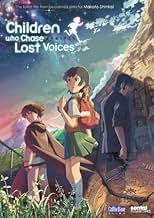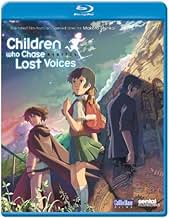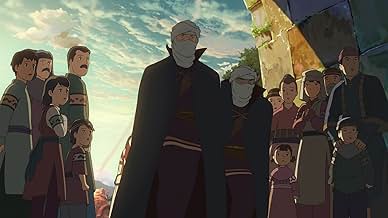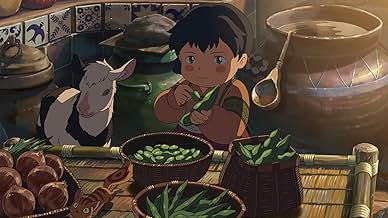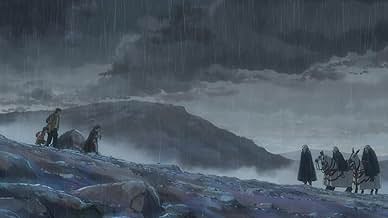VALUTAZIONE IMDb
7,1/10
17.942
LA TUA VALUTAZIONE
Una storia di formazione che coinvolge un giovane amore e una musica misteriosa, proveniente da una radio di cristallo lasciata come ricordo da un padre assente, che conduce una giovane eroi... Leggi tuttoUna storia di formazione che coinvolge un giovane amore e una musica misteriosa, proveniente da una radio di cristallo lasciata come ricordo da un padre assente, che conduce una giovane eroina in un mondo nascosto.Una storia di formazione che coinvolge un giovane amore e una musica misteriosa, proveniente da una radio di cristallo lasciata come ricordo da un padre assente, che conduce una giovane eroina in un mondo nascosto.
- Premi
- 1 vittoria e 7 candidature totali
Miyu Irino
- Shin
- (voce)
- …
Junko Takeuchi
- Mimi
- (voce)
Aki Kanada
- Seito
- (voce)
- (as Aki Kaneda)
Ai Horanai
- Seito
- (voce)
Saya Horigome
- Seito
- (voce)
Mayumi Tsuchiya
- Seito
- (voce)
Mao Kobayashi
- Seito
- (voce)
- (as Satomi Saitô)
Naomi Matamura
- Murabito
- (voce)
Mariko Nagahama
- Murabito
- (voce)
Mika Ishibashi
- Murabito
- (voce)
Yûtarô Honjô
- Murabito
- (voce)
Recensioni in evidenza
According to Japanese anime director Makoto Shinkai, his latest film Children who Chase Lost Voices from Deep Below is a study of "how people are connected" and the relationship between individuals. Although the film is designed primarily for a young audience, adult themes of love and loss abound in its story of mourning lovers attempting to reach out to them across the dimensions. Its theme can also be said to encompass the Four Noble Truths of Buddhism: Life is full of suffering, suffering is caused by attachment, release from suffering is attainable, and there is a path to the end of suffering. Here, the path is setting your loved one free and "saying hello" to a world without them.
Nominated for best animated feature at the Asian Pacific Screen Awards in 2011, the film takes us on a journey to a land deep below the surface of the Earth, the legendary country called Agartha where it is rumored the dead can be brought back to life. Unlike other visionary depictions of mythical kingdoms, Agartha has no magical cities of gold with tall towers and futuristic technology, but rather a rural environment of towns and villages in which mundane life appears similar to those who are called the "topsiders", those who live on the surface (us).
Supported by the ethereal soundtrack of Tenmon http://www.youtube.com/watch?v=NpRFbY189bo, the plot centers around the quest of a young girl of around 11 or 12 named Asuna Watase (Hisako Kanamoto) to find the mythical Agartha, talked about by her substitute teacher, Ryugi Morisaki (Kazuhiko Inoue). Mirroring the Greek legend of Orpheus and Eurydice and its Japanese equivalent, the myth of Izanagi and Izanami, Morisaki longs to travel to Agartha to find his deceased wife Lisa and bring her back with him to Earth. Asuna has also lost a loved one. Her father died when she was little, compelling her mother to work long hours as a nurse. Lonely and withdrawn, she spends her time after school in her private mountain retreat listening to the crystal radio her father had given her.
One day, after hearing beautiful and strange music from her radio, she meets a young boy with supernatural powers named Shun (Miyu Irino), who saves her from the attack of a ferocious bear-like creature. Returning the next day, Shun tells her that he is from Agartha, a land deep inside the core of the hollow Earth. Surprised by a blessing from Shun in the form of a kiss on the forehead, Asuna leaves suddenly but when she comes back the following day, she learns sadly that Shun, while trying to reach for the stars, has fallen off a ledge and died.
Telling her story to Mr. Morisaki, the teacher informs her that in the ancient times, humans were guided by creatures known as "Quetzalcoatls," a name we know from Mesoamerican history as the Aztec God called the "Feathered Serpent" who, according to legend, promised to return one day to lead his people. When Asuna once again returns to her hiding place, she discovers a boy who looks like Shun but who claims to be his brother Shin (Irino). Morisaki poses as a warrior of the group called the Arch Angels, those who want to reach Agartha but are interested only in its wealth and superior knowledge. Morisaki, however, simply wants to find his dead wife Lisa.
Using a device known as a "clavis," he and Asuna enter the underground realms and begin their travel to the Gate of Life and Death, "the undiscovered country from whose bourn no traveler returns." The journey through the subterranean realms is filled with both beauty and the obligatory horror, the norm for sci-fi adventure stories for children. Asuna and Morisaki are attacked by fearful long-toothed monsters (children must have their nightmares), and have to rely on the powers of Shin to save them, even though he had been given the task of retrieving the "clavis" which they possess.
The remainder of the film is filled with numerous plot twists and turns that introduce other characters and some of it can be confusing. The viewer is treated, however, to ravishing visuals that invoke the experience of dimensions far beyond our limited reality. Ultimately, Morisaki and Asuna are forced to choose whether or not they wish to pursue their goal in Agartha or let go and surrender to the wisdom of the universe, and the theme song of the film by Anri Kumaki, "Hello, Goodbye and Hello," http://www.youtube.com/watch?v=UgWb2YSTovA exquisitely embraces the conflicting emotions the characters feel.
Whether or not you have recently lost a loved one, you may find the tears hard to resist. Lost Voices is the first of Shinkai's films that I have seen and it definitely encourages me to see more. Comparisons of Shinkai's themes and style have been made with those of Hayao Miyazaki, but since I have only seen one of Miyazaki's films, I will leave the comparisons to others and just enjoy the warm glow of Shinkai's stunning achievement.
Nominated for best animated feature at the Asian Pacific Screen Awards in 2011, the film takes us on a journey to a land deep below the surface of the Earth, the legendary country called Agartha where it is rumored the dead can be brought back to life. Unlike other visionary depictions of mythical kingdoms, Agartha has no magical cities of gold with tall towers and futuristic technology, but rather a rural environment of towns and villages in which mundane life appears similar to those who are called the "topsiders", those who live on the surface (us).
Supported by the ethereal soundtrack of Tenmon http://www.youtube.com/watch?v=NpRFbY189bo, the plot centers around the quest of a young girl of around 11 or 12 named Asuna Watase (Hisako Kanamoto) to find the mythical Agartha, talked about by her substitute teacher, Ryugi Morisaki (Kazuhiko Inoue). Mirroring the Greek legend of Orpheus and Eurydice and its Japanese equivalent, the myth of Izanagi and Izanami, Morisaki longs to travel to Agartha to find his deceased wife Lisa and bring her back with him to Earth. Asuna has also lost a loved one. Her father died when she was little, compelling her mother to work long hours as a nurse. Lonely and withdrawn, she spends her time after school in her private mountain retreat listening to the crystal radio her father had given her.
One day, after hearing beautiful and strange music from her radio, she meets a young boy with supernatural powers named Shun (Miyu Irino), who saves her from the attack of a ferocious bear-like creature. Returning the next day, Shun tells her that he is from Agartha, a land deep inside the core of the hollow Earth. Surprised by a blessing from Shun in the form of a kiss on the forehead, Asuna leaves suddenly but when she comes back the following day, she learns sadly that Shun, while trying to reach for the stars, has fallen off a ledge and died.
Telling her story to Mr. Morisaki, the teacher informs her that in the ancient times, humans were guided by creatures known as "Quetzalcoatls," a name we know from Mesoamerican history as the Aztec God called the "Feathered Serpent" who, according to legend, promised to return one day to lead his people. When Asuna once again returns to her hiding place, she discovers a boy who looks like Shun but who claims to be his brother Shin (Irino). Morisaki poses as a warrior of the group called the Arch Angels, those who want to reach Agartha but are interested only in its wealth and superior knowledge. Morisaki, however, simply wants to find his dead wife Lisa.
Using a device known as a "clavis," he and Asuna enter the underground realms and begin their travel to the Gate of Life and Death, "the undiscovered country from whose bourn no traveler returns." The journey through the subterranean realms is filled with both beauty and the obligatory horror, the norm for sci-fi adventure stories for children. Asuna and Morisaki are attacked by fearful long-toothed monsters (children must have their nightmares), and have to rely on the powers of Shin to save them, even though he had been given the task of retrieving the "clavis" which they possess.
The remainder of the film is filled with numerous plot twists and turns that introduce other characters and some of it can be confusing. The viewer is treated, however, to ravishing visuals that invoke the experience of dimensions far beyond our limited reality. Ultimately, Morisaki and Asuna are forced to choose whether or not they wish to pursue their goal in Agartha or let go and surrender to the wisdom of the universe, and the theme song of the film by Anri Kumaki, "Hello, Goodbye and Hello," http://www.youtube.com/watch?v=UgWb2YSTovA exquisitely embraces the conflicting emotions the characters feel.
Whether or not you have recently lost a loved one, you may find the tears hard to resist. Lost Voices is the first of Shinkai's films that I have seen and it definitely encourages me to see more. Comparisons of Shinkai's themes and style have been made with those of Hayao Miyazaki, but since I have only seen one of Miyazaki's films, I will leave the comparisons to others and just enjoy the warm glow of Shinkai's stunning achievement.
"Your Name" ended up being one of my favorite movies of last year, and one of my favorite anime of all time, so I went into this film with relatively high expectations, and as a result, I was slightly disappointed. Don't get me wrong; this movie has a lot of things going for it. I loved the melancholic, almost lazy piano music that plays for the majority of the film- it creates a magical atmosphere that works wonders with the animation style and overall arc of the story. The way that characters and creatures are designed is memorable, and sometimes it's even a little bit frightening and bizarre, but that totally worked for me. The landscapes are beautiful and sometimes strange (though we never quite reach the level of artistic mastery that came with "Your Name"). There were some parts where I really felt for the characters, and then there were other times when I was quite bored.
This movie, with its gorgeous animated vistas and hopeful if melancholic feel was impressive overall, even if it suffered from plot incoherence. This is a trend we've noticed in some recent (non-Ghibli) Japanese anime. It also shares a typical feature of these movies, the shy, introspective girl who is drawn into a fantastic world (e.g. The Cat Returns, Wonderland). Here the goal is to explore the underworld, which seems to be a post-mortem realm filled with dead people and gods, vast and yet declining, vulnerable to human infiltration. And that is precisely what happens here, the girl chasing the voice of a love interest she will never really have, and her teacher, who collects lore about the afterlife from ancient cultures, who is looking to retrieve his dead wife. If that sounds like Orpheus, the ending certainly reflects it in some ways, but otherwise there are actually very few allusions to traditions about the underworld, beyond a few monstrous guards, and a steam-punk ancient Mesopotamian aesthetic reminiscent of Castle in the Sky. Despite the awkward plot, my kids and I were drawn in by the amazing visuals and sense of foreboding that is present at the start and only grows as the adventure continues.
Sienna's rating: 7 or 8 stars Paul's rating: 8 stars Seb's rating: 8 stars.
Sienna's rating: 7 or 8 stars Paul's rating: 8 stars Seb's rating: 8 stars.
Every culture has a story about the Underworld, where the souls of the dead reside and where, sometimes, the living can find their way in hopes of bringing a loved one back to life. In "Children Who Chase Lost Voices from Deep Below," Agartha is the name of that Underworld, and when young Asuna (voiced by Hisako Kanemoto) finds herself interacting with a boy from Agartha, Shun (voiced by Miyu Irino), her whole world is changed. Shun saves her from a frightening creature, but then he himself is killed. In the meantime, the substitute teacher taking over for the regular teacher of Asuna's class, Mr. Morisaki (voiced by Kazuhiko Inoue), is all-too-familiar with stories from and about Agartha, and he is determined to get there in order to bring his wife, dead 10 years, back to the world of the living. But the balance of all the worlds depends on such things not happening, and there are many forces arrayed against Mr. Morisaki and young Asuna who has willingly joined him in his quest, for she hopes to find a living Shun. Instead she finds Shun's younger brother, Shin (also voiced by Miyu Irino), whose loyalties and desires are not perhaps favourable to Asuna....
Anime is Japan's version of "cartoons," although they tend to be much more complex and beautiful than Hanna-Barbera ever thought of, and this is one very beautiful piece of work. The images are exquisite and the colours are wonderful, the underworld of Agartha is just as real as the everyday world Asuna initially inhabits. And the storyline, essentially a meditation on letting go of the past while still being free to mourn lost loved ones, is much more resonant for adults than for kids. The writer and director, Makoto Shinkai, has been compared with the great anime master, Hayao Miyazaki, and while those are mighty shoes indeed to fill, Shinkai's work has the same kind of gentleness and beauty; he is surely a talent to watch for in the coming years. A beautiful film, and well worth seeking out.
Anime is Japan's version of "cartoons," although they tend to be much more complex and beautiful than Hanna-Barbera ever thought of, and this is one very beautiful piece of work. The images are exquisite and the colours are wonderful, the underworld of Agartha is just as real as the everyday world Asuna initially inhabits. And the storyline, essentially a meditation on letting go of the past while still being free to mourn lost loved ones, is much more resonant for adults than for kids. The writer and director, Makoto Shinkai, has been compared with the great anime master, Hayao Miyazaki, and while those are mighty shoes indeed to fill, Shinkai's work has the same kind of gentleness and beauty; he is surely a talent to watch for in the coming years. A beautiful film, and well worth seeking out.
Since Hoshi no koe I've been a big fan of Makoto Shinkai and I always find his movies so beautiful that make him the only anime producer who is comparable with Miyazaki Hayao. For his latest work "Children who chase voice from deep below", the story settings and the characters are quite different from his previous works. The idea is likely inspired by the many old myths like the story of Orpheus, who traveled to the underworld and by his music softened the hearts of Gods. Yet "Children who chase voice from deep below" keeps on the track with Shinkai's previous works in discussing loneliness of human beings, but unlike "5 centimetres per second", with hope and love this time.
The music, once again, is perfect and the scenes are delicate and tender. When watching this you find yourself immersed in a dream-like situation where the sky and the trees and the world are of the beauty that far beyond your imagination. Shinkai created perfect environments, the moving wind and the colourful insects, every single detail in every single scene is fantastic. The plot line is a romantic imagination. It portrays a journey of finding hope and love after the every loss throughout our life. It's a reflection of life with fantasy elements. To recover from immense sorrow and stand up again and look forward to the future. I love the message the movie brought to me. However, the story does have flaws. The pace of some parts is too slow while of some parts is too fast. It can be explained by looking at the length of the movie, which is of the longest in Shinkai's works. And obviously, he still has to look for better ways to deal with a "long" movie. Besides it is a pity that Shinkai abandons his talent on talking about modern city life but tries to give a tribute to Miyazaki Hayao by duplicating many elements in Ghibli's anime movies. I have this impression because while watching I thought of Miyazaki Hayao's works like "Princess Mononoke" and "Laputa" in several occasions, yet not as good as those works. A good try with rooms for improvement. After all,however, I still love this film. It reminds me of the beauty in our life. I am particularly touched while on the edge of death the girl Asuna recounts every person in her life she is loved by and says, "After all it was only because of my loneliness." It moves me so much that how our every day will be if we treasure the people still beside us instead of looking for someone or something that is so abstract and beyond our reach. If you love Shinkai, go watch it. It is, definitely, a touching piece for all of us.
The music, once again, is perfect and the scenes are delicate and tender. When watching this you find yourself immersed in a dream-like situation where the sky and the trees and the world are of the beauty that far beyond your imagination. Shinkai created perfect environments, the moving wind and the colourful insects, every single detail in every single scene is fantastic. The plot line is a romantic imagination. It portrays a journey of finding hope and love after the every loss throughout our life. It's a reflection of life with fantasy elements. To recover from immense sorrow and stand up again and look forward to the future. I love the message the movie brought to me. However, the story does have flaws. The pace of some parts is too slow while of some parts is too fast. It can be explained by looking at the length of the movie, which is of the longest in Shinkai's works. And obviously, he still has to look for better ways to deal with a "long" movie. Besides it is a pity that Shinkai abandons his talent on talking about modern city life but tries to give a tribute to Miyazaki Hayao by duplicating many elements in Ghibli's anime movies. I have this impression because while watching I thought of Miyazaki Hayao's works like "Princess Mononoke" and "Laputa" in several occasions, yet not as good as those works. A good try with rooms for improvement. After all,however, I still love this film. It reminds me of the beauty in our life. I am particularly touched while on the edge of death the girl Asuna recounts every person in her life she is loved by and says, "After all it was only because of my loneliness." It moves me so much that how our every day will be if we treasure the people still beside us instead of looking for someone or something that is so abstract and beyond our reach. If you love Shinkai, go watch it. It is, definitely, a touching piece for all of us.
Lo sapevi?
- QuizBefore the film's release in May 2011, manga adaptations were set to begin serialization in April 2011
- Colonne sonoreHello Goodbye & Hello
Lyrics & Music by Anri Kumaki
Arranged by Shun'ya Shimizu
Performed by Anri Kumaki
I più visti
Accedi per valutare e creare un elenco di titoli salvati per ottenere consigli personalizzati
- How long is Children Who Chase Lost Voices?Powered by Alexa
Dettagli
- Data di uscita
- Paese di origine
- Sito ufficiale
- Lingue
- Celebre anche come
- I bambini che inseguono le stelle
- Aziende produttrici
- Vedi altri crediti dell’azienda su IMDbPro
Botteghino
- Lordo in tutto il mondo
- 645.560 USD
- Tempo di esecuzione1 ora 56 minuti
- Colore
- Mix di suoni
- Proporzioni
- 1.85 : 1
Contribuisci a questa pagina
Suggerisci una modifica o aggiungi i contenuti mancanti

Divario superiore
By what name was Viaggio verso Agartha (2011) officially released in India in English?
Rispondi

